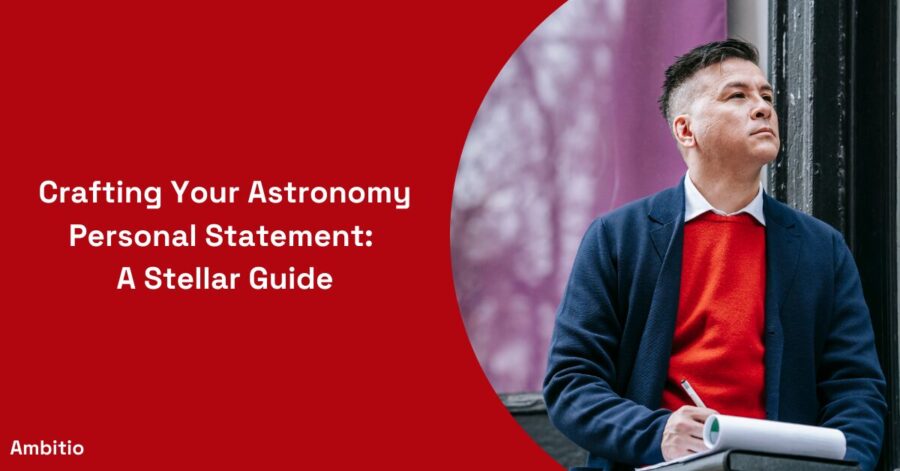14 December 2024
7 minutes read
Crafting Your Astronomy Personal Statement: A Stellar Guide

Crafting Your Astronomy Personal Statement
When it comes to pursuing a career in astrophysics or astronomy, your personal statement is your launchpad into the world of scientific exploration. This essential document offers admission committees a glimpse into your passion for the cosmos and your readiness to embark on a journey through the universe.
In this comprehensive guide, we’ll delve into the key elements of an effective astronomy personal statement and provide valuable insights to help you craft a captivating narrative that will make you shine like a distant star.
Unveiling Your Passion for Astronomy
Your astronomy personal statement should be a testament to your deep-rooted interest in the subject. Begin by sharing your personal journey. Did a specific celestial event, like a meteor shower or a solar eclipse, ignite your fascination with the cosmos?
Describe how your curiosity led you to delve into books, articles, or documentaries about astronomy and astrophysics. This is your chance to convey your genuine enthusiasm.
The Cosmic Spark
In this section, we’ll explore the transformative moment when your interest in astronomy was first ignited. Whether it was a childhood memory of stargazing with a family member or a high school astronomy class that piqued your curiosity, share the details of this pivotal moment. Describe the emotions and thoughts that surged within you, setting the stage for your lifelong fascination with the universe.
The Quest for Knowledge
Your personal statement should not only reveal your passion for astronomy but also highlight the steps you’ve taken to quench your thirst for knowledge. Share the books, documentaries, or online courses that have shaped your understanding of the cosmos. Explain how these resources deepened your fascination and inspired you to seek further education in astronomy.
Bridging the Gap: Physics and Astronomy
Astrophysics and astronomy are intimately linked with physics. Highlight how your interest in physics paved the way for your fascination with astronomy. Discuss any physics-related experiences, such as coursework or research projects, and how they bolstered your understanding of the universe. By showcasing your solid foundation in physics, you’ll reinforce your readiness for undergraduate-level astrophysics studies.
The Physics Connection
In this section, delve into the synergy between physics and astronomy. Explain how your interest in physics naturally led you to explore the cosmos. Discuss the physics concepts that particularly fascinated you and how they relate to astronomical phenomena. This connection will demonstrate your comprehensive grasp of the subject matter.
The Academic Odyssey
To stand out in the competitive world of astrophysics admissions, you need to demonstrate your commitment to academic excellence. In this section, share your achievements in mathematics, physics, and related subjects.
Discuss any honors, awards, or notable projects that showcase your aptitude for analytical thinking, problem-solving, and your ability to grasp complex concepts – all essential skills for an aspiring astrophysicist.
From Fascination to Pursuit
Your personal statement should narrate the transformation of your interest in astronomy into a pursuit. Did you participate in a high school astronomy club, attend summer programs, or volunteer at a local observatory? Share these experiences and explain how they solidified your resolve to study astronomy at the college level.
The Journey Begins
Detail your involvement in astronomy-related activities during your academic journey. Discuss any clubs, workshops, or camps you attended that enriched your knowledge and skills in the field. Highlight your volunteer work or internships, especially if they provided hands-on experience with telescopes, data analysis, or astronomical research.
Bridging Theory and Practice
If you’ve had the opportunity to engage in research or projects related to astronomy or astrophysics, this is the place to showcase them. Describe the nature of the research, your role in it, and any significant findings or contributions you made. Demonstrating your ability to apply theoretical knowledge to practical applications will impress admission committees.
Research and Discovery
Engage the reader by describing any research projects or papers you’ve worked on, especially if they are related to astronomy or physics. Highlighting your contributions to scientific research will strengthen your case as a passionate and dedicated student of the cosmos.
The Research Endeavor
Delve into the specifics of your research experiences. Explain the objectives of your projects, the methodologies you employed, and the outcomes or discoveries you achieved.
Whether you explored the properties of distant galaxies, analyzed celestial spectroscopy data, or delved into quantum mechanics, share the insights gained and lessons learned.
Contributing to the Field
Highlight any instances where your research or discoveries had an impact beyond your academic pursuits. Did your work lead to presentations at conferences, publication in scientific journals, or collaborations with esteemed researchers? Such accomplishments will underscore your potential as a future contributor to the field of astronomy.
Future Endeavors and Career Aspirations
In the grand cosmic tapestry of your astronomy personal statement, the section dedicated to your future endeavors and career aspirations is where you set your sights on the distant stars and chart your course through the celestial realm of astrophysics.
Here, you paint a vivid picture of your cosmic vision, detailing not just where you hope to be in the years to come, but how you plan to make an indelible mark on the field.
Crafting Your Cosmic Vision:
- The Cosmic Vision: Begin by conveying your overarching vision for your future in astronomy. Are you inspired to unravel the mysteries of black holes, study the birth of stars in distant nebulae, or explore the enigmatic realms of dark matter and energy? Share the specific areas of astronomy that ignite your passion and curiosity.
Example: “My cosmic vision is to delve into the mysteries of galactic formation and evolution. I am driven to uncover the processes that shaped the galaxies we observe today and shed light on the universe’s intricate past.” - Impact on the Field: Elaborate on the impact you envision making in the world of astronomy. Explain how your research and contributions will advance our understanding of the cosmos, whether by pioneering groundbreaking theories, discovering new celestial phenomena, or developing innovative technologies.
Example: “I aspire to develop cutting-edge instruments that will revolutionize the field of observational astronomy. By creating more powerful and precise telescopes, I aim to reveal hitherto unseen details of the universe, contributing to our ever-expanding cosmic knowledge.” - Educational and Career Milestones: Lay out the educational and career milestones you plan to achieve. Will you pursue a Ph.D. in astrophysics, engage in postdoctoral research, or join a space agency like NASA? Detail your roadmap for academic and professional growth.
Example: “My immediate goal is to pursue a Ph.D. in astrophysics, where I can specialize in the study of gravitational waves and their implications for our understanding of the universe. Following that, I aspire to collaborate with esteemed researchers and contribute to major international space missions.”
Aligning with Your Chosen Program:
- Choosing the Right Path: Explain how the specific astronomy program and institution you’re applying to align with your aspirations. Mention professors, facilities, or resources that particularly appeal to you. This demonstrates that you’ve thoroughly researched your options and have a clear vision of how your academic journey will unfold.
Example: “I am drawn to [University Name]’s astronomy program because of its commitment to cutting-edge research in astrophysics. The opportunity to work alongside Professor [Professor Name], a pioneer in the study of gravitational waves, aligns perfectly with my research interests.” - Contribution to the Academic Community: Showcase your eagerness to be an active member of the academic community. Discuss how you plan to engage in collaborative research, contribute to departmental initiatives, or mentor aspiring astronomers, thus enriching the learning environment for others.
Example: “I am excited about the prospect of contributing to the academic community at [University Name] by organizing stargazing events for local schools and volunteering as a mentor for undergraduate students. I believe in fostering a culture of curiosity and exploration.” - Continual Learning and Adaptation: Acknowledge the dynamic nature of astronomy and your commitment to continual learning and adaptation. Highlight your openness to embracing new technologies, methodologies, and theories as the field evolves.
Example: “Astronomy is a field that continually evolves, and I am committed to staying abreast of the latest advancements. I look forward to not only absorbing knowledge but also contributing to the ever-expanding body of astronomical discoveries.”
Conclusion
In the vast cosmos of your astronomy personal statement, your future endeavors and career aspirations serve as the guiding constellations that illuminate your path through the celestial domain of astrophysics.
As we conclude this journey through the creation of a compelling personal statement, it becomes abundantly clear that your vision for the future is not merely a wish but a well-defined cosmic roadmap.
As you embark on your journey through the cosmos of astrophysics, armed with this comprehensive personal statement, remember that the universe is as boundless as your aspirations.
With your Cosmic Vision as your guiding star, you’re well-equipped to navigate the unknown, unravel the mysteries, and contribute meaningfully to the profound science of astronomy. The celestial tapestry awaits your unique thread, ready to weave it into the rich fabric of human understanding of the universe.
FAQs: Crafting Your Astronomy Personal Statement
What should I avoid in my astronomy personal statement?
1) Avoid clichés and generic statements.
2) Don’t focus solely on your childhood interest; show your evolution.
3) Steer clear of excessive technical jargon.
Should I include my high school achievements in my personal statement?
1) Yes, highlight relevant achievements in math, physics, or astronomy.
2) Use them to illustrate your academic prowess and commitment.
How long should my astronomy personal statement be?
1) Aim for a concise statement, typically 500-700 words.
2) Focus on quality over quantity; make every word count.
Can I mention non-academic interests or hobbies in my personal statement?
1) Briefly, if they’re relevant, e.g., participation in a science club or stargazing.
2) Connect these interests to your passion for astronomy.
Is it acceptable to seek professional help for writing my personal statement?
1) You can seek guidance from teachers or mentors, but the statement should reflect your authentic voice and experiences.
2) Avoid plagiarism or excessive editing.
How do I balance my fascination with astronomy and physics in my personal statement?
1) Highlight the natural connection between physics and astronomy.
2) Emphasize how your passion for one complements and strengthens your interest in the other.
What if I have limited research experience in astronomy or astrophysics?
1) Focus on your potential and eagerness to engage in research.
2) Highlight any relevant coursework or projects, even if they are preliminary.
How can I make my personal statement stand out among other applicants?
1) Share unique and personal anecdotes that showcase your genuine passion.
2) Highlight any exceptional accomplishments, such as published research or presentations at conferences.
What if I am changing my career path to astronomy from another field?
1) Emphasize how your previous experiences and skills are relevant to your new pursuit.
2) Explain what motivated the transition and how it aligns with your long-term goals.
Can I mention specific professors or facilities in my chosen astronomy program?
Yes, but do so strategically. Show that you’ve done your research and explain why these aspects of the program align with your goals.
Should I include information about my personal life in my personal statement?
Only if it’s relevant to your journey in astronomy. Focus on your academic and professional experiences first.
How can I ensure my personal statement is unique and not clichéd?
1) Avoid generic language and focus on specific experiences and insights that make your journey unique.
2) Share anecdotes that vividly illustrate your passion and dedication.
Is there a recommended structure for my astronomy personal statement?
While there’s no fixed template, the guide provides a structured approach. Start with your passion, delve into your academic journey, discuss research and experiences, and conclude with your future goals.

You can study at top universities worldwide!
Get expert tips and tricks to get into top universities with a free expert session.
Book Your Free 30-Minute Session Now! Book a call now




























